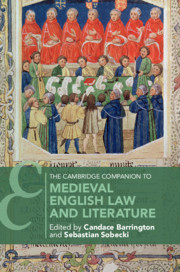Book contents
- The Cambridge Companion to Medieval English Law and Literature
- The Cambridge Companion to Medieval English Law and Literature
- Copyright page
- Contents
- Illustrations
- Contributors
- Abbreviations
- Preface
- Part I Legal Contexts
- Part II Literary Texts
- 7 Treason
- 8 Complaint Literature
- 9 Political Literature and Political Law
- 10 William Langland
- 11 Geoffrey Chaucer
- 12 John Gower
- 13 Lollards and Religious Writings
- 14 Lancastrian Literature
- 15 Middle English Romance and Malory’s Morte Darthur
- 16 Marriage and the Legal Culture of Witnessing
- Index
- References
10 - William Langland
from Part II - Literary Texts
Published online by Cambridge University Press: 26 July 2019
- The Cambridge Companion to Medieval English Law and Literature
- The Cambridge Companion to Medieval English Law and Literature
- Copyright page
- Contents
- Illustrations
- Contributors
- Abbreviations
- Preface
- Part I Legal Contexts
- Part II Literary Texts
- 7 Treason
- 8 Complaint Literature
- 9 Political Literature and Political Law
- 10 William Langland
- 11 Geoffrey Chaucer
- 12 John Gower
- 13 Lollards and Religious Writings
- 14 Lancastrian Literature
- 15 Middle English Romance and Malory’s Morte Darthur
- 16 Marriage and the Legal Culture of Witnessing
- Index
- References
Summary
William Langland’s Piers Plowman, one of the most influential poems of the English Middle Ages, is a poem steeped in law. The poet’s profound engagement with legal concepts, with fourteenth-century legislation and with legal instruments, such as charters and seals, is key to his innovative poetics as well as to his larger project of making English verse a discourse of theology, ethics and reform. Throughout the poem, Langland explores the dynamics of justice and mercy; along the way he touches on such bread-and-butter legal topics as contract, crime, inheritance and bondage. As the poem shows, legal language, whether derived from scripture, from canon, civil, or common law, or from contemporary practice can forge creative, even daring links between politics, religion and social life.
- Type
- Chapter
- Information
- The Cambridge Companion to Medieval English Law and Literature , pp. 121 - 134Publisher: Cambridge University PressPrint publication year: 2019



